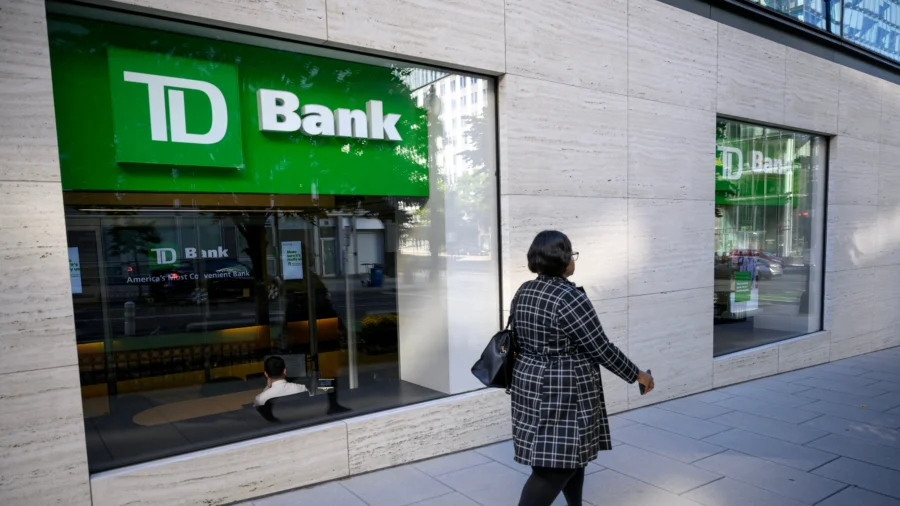TD Bank, the 10th-largest bank in the United States, and parent company TD Bank Group pleaded guilty on Oct. 10 to conspiring to violate the Bank Secrecy Act and money-laundering, agreeing to pay about $3 billion in penalties as part of a historic settlement involving multiple regulatory agencies.
“By making its services convenient for criminals, TD Bank became one,” Attorney General Merrick Garland said during a press conference in Washington. “Today, TD Bank also became the largest bank in U.S. history to plead guilty to Bank Secrecy Act program failures, and the first U.S. bank in history to plead guilty to conspiracy to commit money laundering.”
TD Bank admitted to having “long-term, pervasive, and systemic deficiencies” in its anti-money-laundering (AML) policies, procedures, and controls from January 2014 to October 2023, according to a Department of Justice statement.
These failures allowed criminal networks, including drug traffickers dealing in fentanyl and other narcotics, to launder more than $670 million through the bank’s accounts over several years.
“The bank enabled drug trafficking,” Deputy Secretary of the Treasury Wally Adeyemo said.
One significant scheme involved a money-launderer known as “David,” who processed over $470 million through TD Bank branches between 2018 and 2021.
“David has separately pled guilty to laundering drug proceeds through the bank,” Garland said. “David had attempted to launder money through numerous financial institutions. But he found that TD Bank had the most permissive policies and procedures and chose to launder most of his funds there.”
David bribed TD Bank employees with more than $57,000 in gift cards to ensure the continued processing of his transactions.
Despite depositing large amounts of cash—sometimes over $1 million in a single day—and exhibiting clear signs of suspicious activity, the bank failed to report these transactions as required by law.
In another scheme, five TD Bank employees conspired with a criminal network to launder approximately $39 million by issuing dozens of ATM cards. These cards were used to withdraw funds in Colombia shortly after deposits were made in the United States.
“Things got so bad that five of the bank’s own employees participated in a scheme that laundered millions of dollars to Colombia, resulting in felony convictions for individuals both inside and outside the bank,” Deputy Attorney General Lisa Monaco said.
The bank’s inadequate AML program resulted in 92 percent of its total transaction volume—amounting to approximately $18.3 trillion—going unmonitored from January 2018 to April 2024. These failures enabled multiple money-laundering schemes, some linked to drug cartels and narcotics trafficking organizations.
“TD Bank prioritized growth and convenience over following its legal obligations,” Philip R. Sellinger, U.S. attorney for the District of New Jersey, said. “As a result of staggering and pervasive failures in oversight, it willfully failed to monitor trillions of dollars of transactions—including those involving ACH transactions, checks, high-risk countries, and peer-to-peer transactions—which allowed hundreds of millions of dollars from money laundering networks to flow through the bank, including for international drug traffickers.”
As part of the settlement, TD Bank agreed to pay approximately $3 billion in penalties. This includes $1.8 billion in criminal penalties to the Department of Justice (DOJ), comprising a forfeiture of $452 million and a criminal fine of about $1.43 billion.
The bank also faces civil penalties from multiple regulatory agencies:
- Financial Crimes Enforcement Network (FinCEN): A $1.3 billion penalty, marking the largest civil monetary penalty ever imposed by the agency against a bank.
- Office of the Comptroller of the Currency (OCC): A $450 million civil penalty and growth restrictions until compliance issues are resolved.
- Federal Reserve Board: A $123.5 million fine for violations related to anti-money-laundering laws.
“Today’s historic guilty plea … offers an unmistakable lesson: crime doesn’t pay—and neither does flouting compliance,” Monaco said. “Every bank compliance official in America should be reviewing today’s charges as a case study of what not to do. And every bank CEO and board member should be doing the same. Because if the business case for compliance wasn’t clear before—it should be now.”
TD Bank’s parent company, TD Bank Group, acknowledged the failures and outlined steps taken to remediate its AML program.
“We have taken full responsibility for the failures of our U.S. AML program and are making the investments, changes and enhancements required to deliver on our commitments,” Bharat Masrani, Group president and CEO, said in a press release. “This is a difficult chapter in our bank’s history.”
Bank officials said they have overhauled their AML leadership team, added new compliance specialists, and implemented stronger detection and data management technologies.
“Our U.S. operation is strong, and we will continue to serve the needs of the 10 million households and businesses in the U.S. who rely on us for their financial goals,” said Leo Salom, TD Bank’s president and CEO.
The settlement involved coordination with the DOJ, FinCEN, the OCC, and the Federal Reserve Board.
The OCC also imposed growth restrictions on the bank until compliance issues are resolved.
“TD Bank’s persistent prioritization of growth over controls allowed its employees to break the law and facilitate the laundering of hundreds of millions of dollars,” Acting Comptroller of the Currency Michael J. Hsu said. “The OCC’s coordinated and comprehensive action … will ensure that the bank focuses on building proper controls commensurate with its risk profile.”
The Justice Department emphasized that investigations into individual employees at every level of TD Bank are “active and ongoing.”
Garland said: “No one involved in TD Bank’s illegal conduct will be off limits. We will follow the evidence wherever it leads.”
The bank, officially named Toronto-Dominion Bank, and its subsidiaries are collectively known as TD Bank Group, with world headquarters in Toronto. It is the sixth-largest bank in North America by assets and serves over 27.5 million customers, according to a bank press release.
From The Epoch Times

